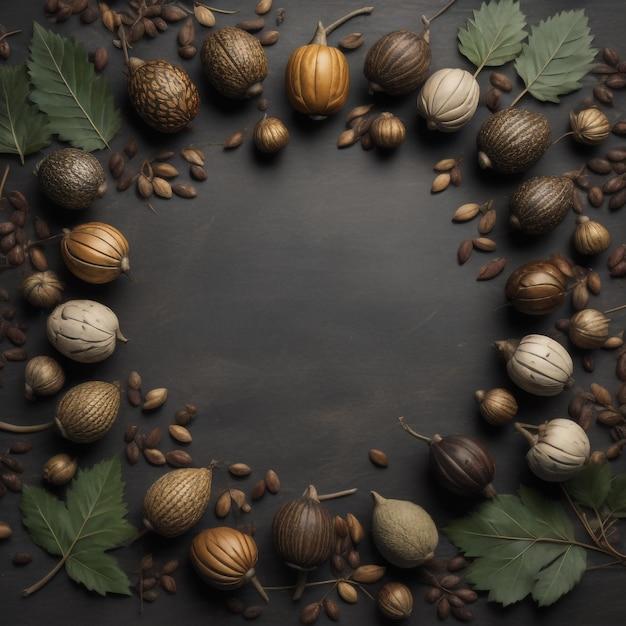Acorns are a familiar sight for those who live amongst oak trees in Georgia. These small, nut-like seeds are produced by oak trees and serve as an important food source for various wildlife species. Many people may wonder when acorns typically fall in Georgia and what factors influence their abundance. In this blog post, we will explore the timing of acorn fall, their significance, and address common questions such as the impact of acorns on lawns and the edibility of these natural treats.
As tree enthusiasts and nature lovers eagerly anticipate the arrival of autumn, acorns play a crucial role in painting the landscape with their presence. So, whether you’ve been curious about the timing of acorn fall or have been wondering why some years seem to bring an abundance of these seeds, this blog post aims to provide you with all the information you need. We’ll dig deeper into the connection between acorns and oak trees, explore the phenomenon known as mast years, and address misconceptions surrounding the impact of acorns on the weather. Get ready to learn all about acorns in Georgia!
When Do Acorns Fall in Georgia
If you’re a nature enthusiast or simply enjoy the beauty of the great outdoors, you’ve probably found yourself wondering, “When do acorns fall in Georgia?” Well, my curious friend, you’ve come to the right place to uncover the secret timing of these little natural wonders.
The Marvelous Season of Acorns
When Autumn Beckons
When the air turns crisper and the leaves begin to don their vibrant hues, it’s a telltale sign that autumn has arrived in Georgia. This delightful season, usually from September to December, brings with it an abundance of acorns gracefully cascading from the majestic oak trees.
An Oak Tree’s Timekeeping
Mother Nature has an impeccable sense of timing, and the oak trees in Georgia most certainly abide by her rules. While the precise timing can vary depending on weather conditions and the specific oak species, the majority of acorns start falling during the months of September and October. It’s a magical sight to behold!
The Dance of Acorn Species
Mighty Red Oaks
Red oaks are notorious for their fashionably late arrival at the acorn-dropping party. These bold and magnificent trees tend to shed their acorns towards the end of September, and their grand finale can extend into early November. So, if you’re ever searching for abundant acorns beneath a majestic oak tree, seek out the red oaks first.
The Reliable White Oaks
If you’re looking for consistency, the white oaks in Georgia won’t disappoint. Their acorns usually start falling in early to mid-September and continue to grace the forest floor until October. These dependable trees are generous providers, ensuring there’s always a hearty supply of acorns available for squirrels, birds, and other woodland creatures.
The Enigmatic Pin Oaks
Pin oaks, with their distinctive pyramid-shaped crowns adorned with lustrous leaves, are known to hold their acorns tight until mid to late October. They may seem a bit mysterious, but their acorns are worth the wait. Their late arrival adds a sense of suspense to the acorn-gathering season, keeping both humans and wildlife on their toes.
The Importance of Timing
Squirrel Shenanigans
Squirrels play a crucial role in the dispersal and survival of acorns. These nimble creatures are experts at gathering and storing acorns for the winter months. As acorn enthusiasts themselves, they have a keen sense of timing and won’t hesitate to gather as many acorns as possible before their furry competitors snatch them away.
Nature’s Nutritious Cycle
The timing of acorn fall in Georgia is not determined by random chance but serves a greater purpose in the intricate web of nature. As acorns drop to the forest floor, they provide nourishment to countless wildlife species, including deer, turkeys, and even insects. This natural bounty ensures a healthy ecosystem and keeps the circle of life spinning harmoniously.
Embrace the Acorn Season
Now that you’re familiar with the remarkable timing of acorns in Georgia, you can plan your woodland adventures accordingly. Spend a glorious autumn day wandering beneath the oak trees, relishing the vibrant colors, and listening to the melodious rustling of falling acorns. It’s nature’s symphony, and you, my friend, have a front-row ticket to witness this enchanting spectacle.
FAQ: When Do Acorns Fall in Georgia
Welcome to our comprehensive FAQ guide on the timing of acorn falls in Georgia. Here, we’ll address common questions and concerns regarding acorns, including their abundance, impact on oak trees, and potential effects on your immediate surroundings. So, get ready to dive into the world of acorns and discover fascinating insights into these little tree treasures.
Why Are There No Acorns This Year (2020)
It’s not uncommon for oak trees to enter an “off year” or “mast failure” when they produce very few or no acorns. Several factors can contribute to this, such as unfavorable weather conditions during the pollination period or the tree’s natural cycle of conserving energy. So, if you’ve noticed a lack of acorns in 2020, don’t worry—it’s just nature taking a little breather.
Do Lots of Acorns Mean a Cold Winter
While folklore might suggest a connection between abundant acorns and harsh winters, there’s no scientific evidence to support this claim. Acorn production primarily depends on the tree’s health, weather conditions during pollination and fruit development, and the tree’s unique reproductive cycle. So, gather your acorns freely without worrying about future weather forecasts.
Is There a Shortage of Acorns This Year
As we mentioned earlier, oak trees can experience mast failures, resulting in low acorn production for a given year. However, it’s essential to remember that oak trees have alternating years of high and low acorn abundance. So, even if there might be a shortage in some years, rest assured that the acorns will make a triumphant return before you know it.
What Does It Mean When You Have a Lot of Acorns Falling
When an abundance of acorns falls from the trees, leading to a literal acorn shower, it is called a “mast year.” This occurrence happens cyclically, typically every two to five years, and it reflects the tree’s natural reproduction strategy. The surplus of acorns provides a greater chance for offspring to survive, ensuring the continuity of oak tree populations for generations to come.
Do Oak Trees Drop Acorns All Year
No, oak trees do not drop acorns all year round. The majority of oak species follow an annual cycle where acorns start to fall in late summer to early autumn. The exact timing can vary depending on the species and environmental conditions, but keep your eyes peeled during those months if you’re gathering acorns or simply enjoying their presence.
Do Acorns Fall in Autumn
Yes, acorns typically fall during the autumn season. As summer comes to a close, oak trees begin their acorn drop, signaling the arrival of autumn. So, as the leaves change color and the air turns crisp, be ready to witness nature’s stunning display of acorns falling gracefully from the mighty oaks in Georgia.
How Do You Stop Oak Trees From Producing Acorns
While it may be tempting to put an end to the acorn deluge in your backyard, stopping oak trees from producing acorns is no easy task. Oak trees are hard-wired to go through their reproductive cycle, which includes the production of acorns. Pruning or removing the tree entirely might be the only options if you’re determined to reduce acorn production. However, remember that these majestic trees contribute immensely to the ecosystem, providing shelter and sustenance for numerous creatures.
When Should I Gather Acorns
The best time to gather acorns is when they have fully ripened and fallen from the tree naturally. Usually, this occurs in late summer to early autumn. Be sure to choose acorns without any visible damage or holes, as these are likely to harbor pests or be unfit for consumption. Nurturing acorns from oak trees also offers a gratifying experience if you seek to grow your own little grove.
What Happens If You Eat a Raw Acorn
Raw acorns have high tannin content, which renders them unpalatable and potentially harmful if consumed in large quantities. These bitter compounds can cause gastrointestinal distress and even be toxic to some animals. If you’re interested in incorporating acorns into your diet, it’s crucial to leach the tannins out before consumption through processes such as boiling or soaking.
Do Acorns Damage Lawns
While the sight of numerous acorns dotting your lawn may give you pause, rest assured that they pose minimal damage to your turf. In fact, the acorns may even provide a natural fertilizer as they decompose. However, be cautious while mowing as the acorns can become projectiles. So, keep your lawnmower blades well away from any potential acorn landmines during autumn.
Why Do Oak Trees Have More Acorns Some Years
Oak trees have evolved a strategy called “masting” to ensure their survival and perpetuation. Masting refers to the synchronized production of an excess number of acorns within a given year, alternating with years of low production or mast failures. Researchers believe that masting occurs to overwhelm seed predators, ensuring at least some acorns survive to maturity, and maximizing the tree’s reproductive success.
Is 2021 a Mast Year for Acorns
As of our current knowledge in 2023, we are unable to predict specific mast years without observing real-time data. Remember that masting occurs cyclically and varies between species. So, keep your eyes peeled for signs of abundant acorn production, and you might just witness a mast year when you least expect it.
What Time of Year Are Acorns Ripe
Acorns typically ripen in late summer to early autumn. During this period, they undergo changes in color, typically transitioning to a brown hue. It’s essential to allow the acorns to ripen and fall naturally from the tree before gathering them for consumption or propagation. Patience and observation will reward you with ripe and ready-to-use acorns.
Can I Eat Acorns From My Oak Tree
Yes, acorns can be eaten, but proper processing is necessary. As mentioned earlier, raw acorns have bitter and astringent tannins that make them unappetizing. However, Native American cultures have traditionally used acorns as a staple food source by employing leaching methods to remove the tannins and unlock the acorns’ nutritional potential. So, with the right techniques, you can turn those acorns into a delicious and nutritious treat.
Why Are So Many Acorns Falling This Year (2021)
Ah, the mystery of Mother Nature’s acorn abundance! While we can’t pinpoint the exact reasons behind a particularly bountiful year, factors such as favorable weather conditions during pollination and fruit development, in addition to cycles of masting, can contribute to a surplus of acorns. So, embrace the seemingly endless acorn shower this year and revel in the wonders of nature’s cycles.
We hope this FAQ guide has shed light on the intriguing world of acorns and their seasonal falls in Georgia. Whether you’re curious about the absence or excess of acorns or simply considering venturing into the world of acorn-based cuisine, understanding the patterns and significance of acorn falls adds depth to your appreciation of these remarkable tree seeds.
Happy acorn-gathering and may acorns continue to bless your path in the years to come!

